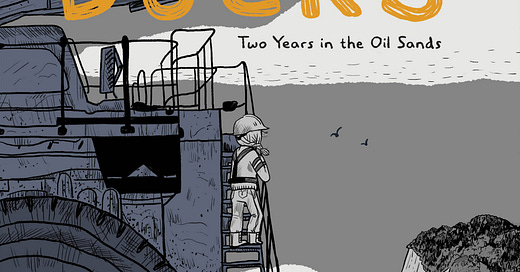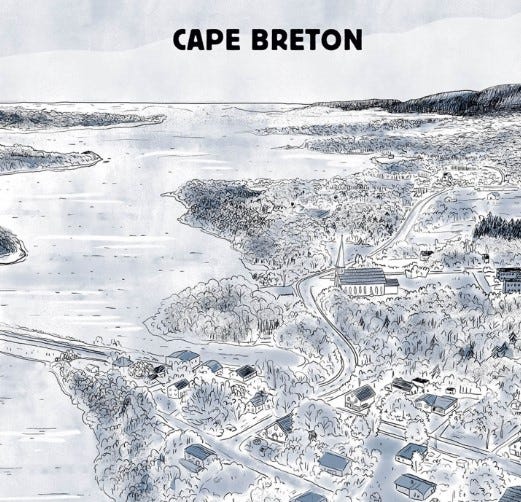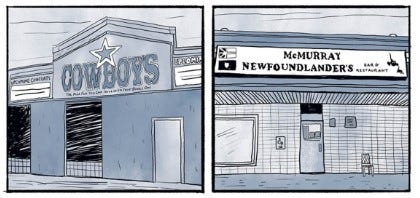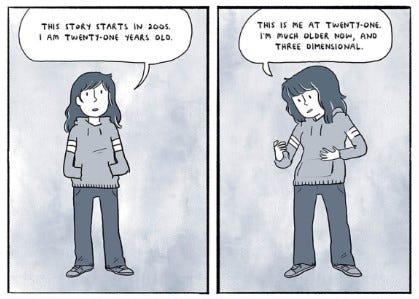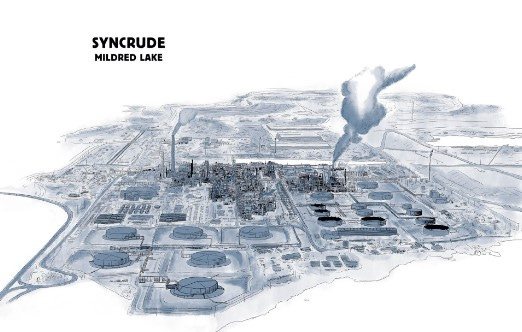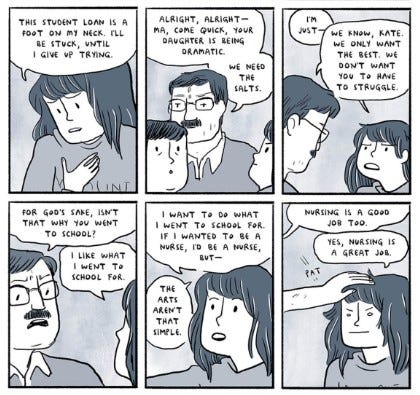Honestly, my first thought was “Graphic memoir” that’s a little pretentious isn’t it?”, but as I read this book, I couldn’t imagine describing it in any other way. There are some pretty sensitive topics ahead, so proceed with caution. DUCKS is the story of a young woman living and working in the “camps” of the Alberta oil sands (where men outnumbered women roughly 50 to 1) and all that entails.
I typically use this newsletter to encourage young readers, so most of my reviews are focused on child and youth friendly material. Unlike my recent reviews of Kukuburi and Tuki, this one is not meant for kids.
I feel uncomfortable posting a comic this week because the material contained in this graphic memoir is something that I think should be described respectfully. The thought of pre-empting this review with a somewhat humorous, or lighthearted comic strip feels somehow disrespectful.
I will post the next strip of the Mumpworld comic separately, so stay tuned for that (I’ll put a link in the comments at the very least when it is available).
Therefore, we shall proceed with the review of Kate Beaton’s DUCKS.
I have been waiting for this book to be released for at least 6 months. I have to be honest here, I was not familiar with Kate Beaton’s work on projects such as “Hark! A Vagrant” (online) or “Step aside Pops” the printed collection before this. I can only attribute that to my disconnection from the world of comic strips. My obliviousness is certainly not an indication the quality of Kate Beaton’s work which is remarkable.
I was, however, aware of the the publisher. Drawn and Quarterly is a well respected book publisher in Canada that I knew typically promoted work of the utmost quality and relevance. They sometimes pushed the boundaries of social commentary, but did so in a purposeful and thought provoking way. I found a description of the book on their website while looking at other books that they publish, and was instantly intrigued.
That intrigue likely had a number of sources. It could have stemmed from my own personal ties to the Maritime Provinces and Cape Breton in particular. Or it could come from my associated connections with hard working tradespeople who inhabit this part of the world. It could also be my own lived experience of travelling far from “home” with the intent of making money and paying off student loans while living and working in the Northwest Territories. I have known men and women all of my life who have had similar experiences. As a therapist, I am also keenly aware of the frequency with which human beings treat each other horribly and chip away at one another’s sense of self worth and resilience. All of this life experience meant that Kate’s story was inevitably going to strike a chord with me in one way or another.
I have to be honest, my interest was coloured with a slight sense of trepidation as well. What little I knew of the book, the author and the subject matter indicated the possibility that the end result could be very skewed, distorted or one sided. The “Oil Sands” and all of the environmental, cultural, economic and human ramifications are very complex and challenging to document. The current polarized political and cultural environment that we live in does not seem to allow for nuanced discussion or exploration of any topic. I am pleased to report that Kate Beaton dances through this minefield with grace and consideration of all viewpoints without “talking down” to anyone. It is a remarkable feat.
The current polarized political and cultural environment that we live in does not seem to allow for nuanced discussion or exploration. I am pleased to report that Kate Beaton dances through this minefield with grace and consideration of all viewpoints…
I try not to give too much away when I review a book and this one is no exception. I would prefer that readers pick up the book and experience it for themselves. That being said, I have to provide some insight into the story and the impact that it may have. As a slight aside, be aware that Kate does her best throughout the book to represent the accents and colloquial phrases of both people from Cape Breton and Newfoundlanders. Expect some interesting dialog that may not seem clear at first. I can assure you the language in the book is actually a rather tame version of both of these cultures. My personal favourites, which I don’t think actually appear in the book, are “Gwan-wich-a” and “yous fellas”, although “yous” is part of Kate’s mother’s vocabulary she doesn’t use it in the way I am familiar with from the Glace Bay and Donkin area.
As a 21 year old university graduate in 2005, Kate was faced with a hard reality. She could get a job near her home and begin a long and onerous process of paying off her student loans which may take ten or more years. Her other option being, to travel across the country in order to make a much higher salary and pay the loan off in a reasonable amount of time. For many Maritimers, if they had any aspirations for a better life, the latter option was the only realistic one at the time. That option for many was the Alberta Oil Sands and the camps that built up around them.
In the camps, Kate experienced frequent misogynistic behavior eventually going much further than simply crude comments or juvenile humour. The events of the graphic novel had a lasting impact on her, which obviously led to the release of this book 17 years later. Even though Kate’s experiences in the camps were at times horrible and dehumanizing, she manages to weave in a thread of understanding and appreciation for the lived experience of the men in the camps as well. There are a number of examples of good men who seemed to be supportive, or at the very least non-participants in the overwhelmingly problematic behavior that seemed so commonplace. Kate questions, a few times throughout the book, whether these same men would behave this way at home. This of course also brings into question whether the men at home would behave as poorly if they were in the camps.
Kate’s personal experiences are of course the main focus of the book. She does also raise concerns about the living and working conditions for the tradespeople and laborers, mostly men, who faced sometimes deadly consequences for their choice to work in the oil sands. She discusses the effect on families of having one parent leave for weeks or months at a time while the other manages the home and children alone. Kate also touches on the topic, through her own personal growth, of the environmental and cultural issues with exploiting natural resources. The land on which such projects are developed often has traditional meaning and value. It is the home to native Canadians or aboriginal peoples who at the time were rarely consulted in any meaningful way. They also suffer from the effects of the environmental destruction.
There is much to digest in this 430 page Graphic Memoir. There are sad moments and moments of humour. There are moments that are horrifyingly real. Many things have very likely changed greatly since Kate’s time in the oil sands projects. I suspect, however, that women today face very similar challenges in many other industries which makes this story relevant and powerfully important now. I hope and expect that DUCKS will find a wide audience outside of the typical graphic novel community. Much like iconic works such as Maus and Persepolis, it is my opinion that DUCKS should be a graphic novel that is available in every public library and read in every home by adults young and old.
If you haven’t picked up a copy yet, you should, and share it with everyone you know.
I hope you have found this review of value, and I’ll see you next time.
blackManic


